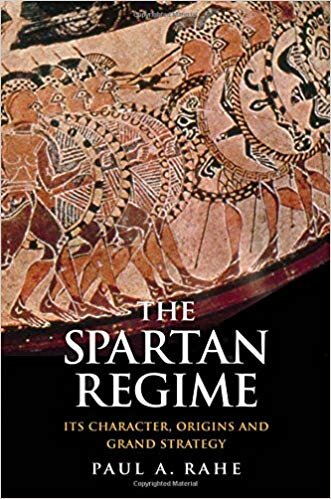The Spartan Regime by Paul Rahe Book Review
Paul A. Rahe’s The Spartan Regime [Amazon link] is a slim volume on Sparta is absolutely packed with details. Rahe blends history, paleolinguistics, archeology, and even ancient DNA into his argument for why Sparta ended up with one of the most astonishing social and legal structures of the classical age.

THE SPARTAN REGIME BY PAUL A. RAHE YALE UNIVERSITY PRESS (SEPTEMBER 27, 2016)
Sparta was a politeia unlike any of the others, a source of both fascination and hatred for at least 2,500 years. The hold of Sparta on both educated and popular opinion is all the more remarkable since they left almost no written records. Athens and Rome left copious literatures behind them to help cement their place in history. There are some contemporary accounts of Sparta from Classical Greece, and a few more from later eras, but the historical evidence is thin.
Rahe augments his argument with the archaeological record, which he uses in part to help corroborate or downplay the written accounts we do have. Something that is new to me is that Rahe argues the 465 BC earthquake that destroyed Sparta not only contributed to the Peloponnesian War, but also destroyed the demographic base of Sparta. In theory, homoioi had a Spartan mother and father, but in the aftermath of the earthquake men of more varied parentage were elevated as peers. This is a plausible explanation for the sudden drop about this time in the strength of the Spartan phalanxes, since they were crippled by the loss of so many citizens. In general, I had suspected that their purity obsessions and harsh agoge kept their numbers lower than they otherwise might have been, but such an event could have pushed their population into a demographic downward spiral.
Rahe is frank about the inherent difficulty of interpreting the sparse information we have on Sparta. Everyone brings their own biases to the table, so the best we can do is acknowledge our own points of view and then make the best argument we can. This is made harder because we have to contend not only our own biases, but also those of the authors who did write something down about Sparta, at the distance of more than two millennia. While I am not a specialist here, I felt that Rahe explained his reasons for weighing the evidence reasonably well to a popular audience.
I am a fan of Rahe’s argument that Spartan society evolved out of the precarious strategic situation of Laconia after the Dorian invaders/bandits who were their ancestors managed to over-extend their domain, and were forced to subordinate absolutely everything to political unity and military preparedness. My favorite section of the book was where he delved into the evidence for what Sparta was like before the Classical Era, before the hoplite phalanx had even been invented. In part, Rahe does his work here by taking oral history seriously, which is quite different than uncritically.
But he is also aware that no one lives up to their own legends. Not even the Spartans. Rahe has more volumes on Sparta coming out, so perhaps I’ll check those out too. Highly recommended.



Comments ()